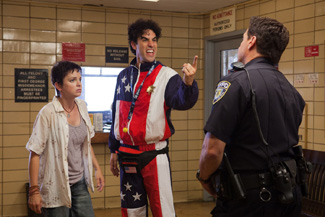Movie Review: The Dictator
By Matthew Huntley
May 29, 2012
I probably agree with almost everything Sacha Baron Cohen says and stands for. The liberal-minded comedian is known for speaking his mind through over-the-top characters and brazenly lampooning such notions as narrow-mindedness, racism, jingoism, homophobia and anything else that involves judgment or discrimination on a superficial level. Yes, he can go too far, but I believe he’s trying to do a good thing by attempting to open people's minds, even if his methods are sometimes questionable and mean-spirited.
However, while I applaud what he’s saying (most of the time) from a political and social standpoint, the way he says it isn’t always funny, fresh or entertaining, which can be a problem from a film critical standpoint. Like many, I first noticed a decline in quality when Bruno (2009) came out, and that trend continues with The Dictator, a surprisingly flat and hackneyed comedy. Even Cohen’s most ardent fans will recognize he’s either retreading the same waters or missing his marks altogether. I think if Cohen wants to reinvent himself and stay relevant, he actually needs to go beyond the left-wingers and appeal to those would wouldn’t normally watch him, which would prompt him to try new material. Otherwise, he’ll simply be preaching to the choir over and over again, and the problem is the choir has heard his sermon before.
Cohen’s agenda this time is to send up the idea of an unjust, authoritarian dictatorship. The main character is no doubt influenced by Saddam Hussein, Muammar al-Gaddafi and Kim Jong-il, to whom the film is “dedicated in loving memory.” Cohen plays their outlandish counterpart, Admiral General Hafez Aladeen, who rules the fictional country of Wadiya in North Africa. Fitting right in among the despotic tyrant stereotypes, Aladeen is self-important; changes the law (and common words and phrases) at will; orders hasty executions; views Jews as the enemy for no good reason; and treats women as animals who are only good for two things: sex and bearing sons. In one scene where he delivers a baby and finds out it’s a girl, he asks, “Where’s the trash can?”
Pressured by the United Nations Security Council to have Wadiya inspected for nuclear weapons, Aladeen travels to New York City to address his enemies. But before he can give his speech, he’s kidnapped by an inept assassin named Clayton (John C. Reilly), who shaves off the dictator’s signature beard and tries, unsuccessfully, to torture him (Aladeen amusingly educates Clayton in modern torture tactics and devices). Now unrecognizable, Aladeen learns of the plot meant to kill him so he can be replaced with a lookalike decoy, whose job is to go before the world and declare Wadiya a democracy.
On his mission to regain power, Aladeen meets Zoey (Anna Farris), an activist who mistakes him for a Wadiyan refugee. Zoey runs one of those earth-friendly stores that sells organic food and employs only foreign emigrants, so naturally Aladeen feels out of place. He happens upon New York’s “Little Wadiya” and finds the former head of his nuclear divisions program, Nadal (Jason Mantzoukas), whom Aladeen had ordered to be executed. But, as it turns out, anyone he issued to be killed was relocated to America, so he’s technically not responsible for any deaths.
That last detail should clue you in on how The Dictator ultimately settles for less bold comedy and chooses a safer, more traditional path, including a standard romantic comedy arc. I assumed Cohen was too smart for this, but he seems to have been overpowered by the mainstream studio system, which may have pressured him to churn out a likable hero and a happy ending so as not to leave audiences feeling angry or disturbed. Even with all its vile and crude humor (there’s a funny shot that takes place inside the female sex organ), it doesn’t take many risks on a high level. It’s more a typical raunchy comedy than a shock-inducing social commentary. We usually leave a Sacha Baron Cohen movie with our jaws to the floor, but here we leave shrugging our shoulders. The jokes feel recycled and the four-person screenplay doesn’t go anywhere we don’t expect. And when it can’t think of anything witty, biting or insightful to say, it resorts to cheap slapstick. We watch and snicker at the movie, but we don’t really react to it.
The underlying problem is Cohen and director Larry Charles seem to give audiences what they think they want instead of something new and challenging. In a way, they settle for their same old routine, maybe even less. For longtime Cohen fans, this may have sufficed back before we saw Borat or Bruno, but we’ve since moved on and expect greater things.
With that said, will you like The Dictator if you haven’t seen the former movies? You might have a few laughs and acknowledge the filmmakers approached the line that goes too far, but hindsight, you’ll wish they’d crossed it and ventured into new territory.
|
|
|
|




